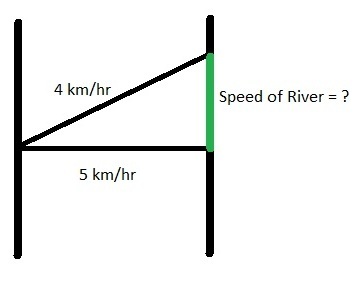The River Crossing
Classical Mechanics
Level
2
If a boat has a speed of 5 km/h in still water, and crosses a river at a speed of 4 km/h, what is the river speed? Answer in km/h.
The answer is 3.
This section requires Javascript.
You are seeing this because something didn't load right. We suggest you, (a) try
refreshing the page, (b) enabling javascript if it is disabled on your browser and,
finally, (c)
loading the
non-javascript version of this page
. We're sorry about the hassle.
Here is the diagram which visualizes the given question :
The green line shows the velocity of the river. The velocity of the boat while crossing river (4 km/hr) and the velocity of the river are the given vectors to which the speed of boat in still water (5 km/hr) is the resultant vector. Let the velocity of water be a .
a i + 4 j = 5
⟹ a 2 + 1 6 = 2 5
⟹ a = 2 5 − 1 6 = 9 = ± 3
Since speed cannot be negative the speed of river is 3 k m / h r